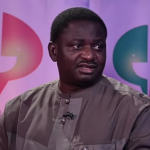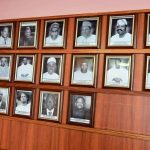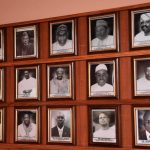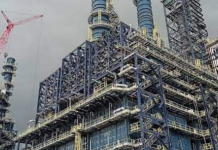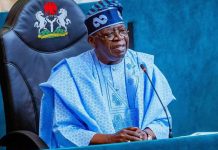Every Thursday, we hold what we call State House Press Briefing at the Press Gallery of the Presidential Villa, Abuja. The intention is to keep the public up to speed with the activities of the President Muhammadu Buhari administration.
Last week, our guest was Borno State Governor, Prof Babagana Zulum. In almost 30 editions of the special briefing, only one Governor had featured before. Engineer Dave Umahi of Ebonyi State. Zulum was the second.
The idea was to get first hand brief of the security situation in Borno State, which has been beleaguered and besieged since 2009, when Boko Haram burst on the national scene. For more than 13 years, the once peaceful State had become a theatre of bloodletting, characterized by bombings, maiming, killings, abductions, and other horrendous acts. In fact, it had spread all over the North East, then to the North West, North Central, including Abuja, the seat of the Federal Government.
The country was about to be overrun, till Muhammadu Buhari came in 2015, and took the battle to the insurgents. They were clobbered and driven out of major parts of the North, till they got circumscribed in Borno, which was the epicenter of the insurgency.
So Gov Zulum was the appropriate person to brief the country on efforts made, successes attained, and what remained to be done. What did he tell the Press?
Insurgency has been a curse to the North East, and Borno State in particular. In fact, the total loss is in the region of $7 billion. Apart from thousands of human lives, destroyed infrastructure include 900,000 houses, 5,000 classrooms, roads, bridges, 713 energy distribution lines, 1,600 water sources, and telecommunication infrastructure, and other public installations. At least 49,311 widows had been spawned, with 49,917 orphans.
But is it a hopeless case? Must we throw our hands up in surrender? Hear the emissary of hope called Zulum, a veritable Nigerian star, and inspiring public servant.
“With the mass surrender of Boko Haram insurgents, normalcy is expected to return to most parts of North East soon….The gradual return of peace can be attributed to the commitment and collaboration on the part of the State and the Federal Government.”
Still some good news: “Internally Displaced Persons (IDPs) are returning to their communities, farming is picking up, markets are reopening like Monguno market, the one in Damasak, and in Gubio. Such level of achievements will never have been possible without collaboration and creating of enabling environment. We have rehabilitated up to 50,000 houses, major roads like Maiduguri to Damso, Maiduguri to Gwoza, Banki-Bama , have been reopened.”
A lot of advances have been made in the anti-insurgency war, but we can’t say the final hurrah yet. The Governor thinks we might need the help of mercenaries, something President Buhari, a retired army general, is opposed to. The President can’t fathom that the same Nigerian Army that performed excellently in Burma, Congo, Sierra Leone, Liberia, and other theaters of conflict, should find it impossible to extirpate Boko Haram. Does it then mean Zulum disagrees with the President?
“Governance is not static,” he said. “The President disagreed with the idea of mercenaries in the past, but he may have cause to reconsider. Even countries that are stronger than us have cause to seek external help when necessary.”
The Governor gives reason for the level of success recorded so far, which holds vital lessons for some cantankerous States helmsmen in the country:
“One of the fundamental reasons we continue to succeed in our fight against insurgency is that there was never a time I asked to see Mr President, and I was denied access.”
And that is President Buhari for you. Give every person his due. Some Governors abuse him in daytime, come to the Presidential Villa under cover of darkness, and he still opens the doors to them.
Some Governors think they can be heroes by antagonizing the President. If they owe salaries and pensions, once the month is ending, they begin to abuse the President, thinking their people would forget the outstanding salaries and pensions. When they have not built a single kilometer of road, it is Buhari. When infrastructure has decayed under them, it is Buhari. When they can’t secure the lives and property of the people they govern, it is Buhari. They play to the gallery, thinking they will receive applause from their people. No, the only sound the people hear is the rumbling from their bellies, due to hunger. And they know where their problems come from.
A couple of weeks earlier, the media had been awash with stories of two local governments being under Boko Haram occupation, credited to the Governor, making it seem contrary to the position of the President that no Nigerian territory is now in the hands of terrorists. What’s the truth?
“The two local governments are not under Boko Haram occupation. It is just that the people don’t feel safe enough to return home. Boko Haram is not in charge of the places. The military actually occupy the local governments, not insurgents. Just that the people don’t feel confident enough to return yet.”
Explanation made. But it didn’t hug the headlines as the earlier erroneous story had done. Typical of us media people. Bad news sells more.
Is the job done in terms of security? Not yet, the Governor tells you matter-of-factly. “There are still security challenges, but milestones have been achieved because of collaboration between the Federal Government and Borno State, the Armed Forces, Police, DSS, and other security agencies. Bomb attacks have reduced by almost 90%. Over 5,000 physical infrastructure have been built by the Federal and State governments.”
Islamic State West Africa Province (ISWAP). That is a scourge the Governor warned the country about. He said the way they were proliferating, with seemingly boundless resources available to them, they might be worse than Boko Haram, if care was not taken. Early warning. And I’m sure the right people in government have heard, and are doing something about it.
Governor Zulum is sure doing great things in Borno State, in terms of human and infrastructural development. A 25 years development plan and 10 years strategic transformation initiatives have been formulated.
“Our vision is a secured, competitive agri-business and commercial hub anchored on prosperous, dignified people and sustained development. In 10 years, we plan to have a self-reliant Borno with over 70% productive population.”
About 9,500 resettlement houses have been built for displaced people. Twenty new schools constructed, and 39 existing ones completely rehabilitated, 432 classrooms and 242 wash facilities constructed in 48 schools, 37 new primary healthcare centers in 17 local government areas, 676 medical workers recruited from 2019 till date, 24 new roads constructed, including Borno’s first flyover, which President Buhari commissioned last December, 779 new boreholes drilled, 545 existing ones rehabilitated, 30,000 hectares of farmlands cultivated in resettled communities, 18 communities resettled with livelihood support.
And the half, nay, one quarter, has not yet been told. Gov Zulum is a star of this administration, and of this generation. Like I wrote before, we shall surely be hearing much more of him in the months and years to come, God willing.
